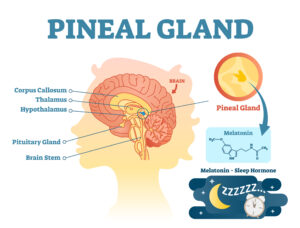A good night’s sleep is essential for the overall health and well-being of every child. As a parent, you understand the importance of ensuring your child gets enough rest. However, many parents struggle with bedtime issues and are unsure where to turn and in need of a quick fix. Melatonin, a hormone known for its role in regulating sleep-wake cycles, is a popular sleep aid. It’s often seen as a quick and easy solution for bedtime struggles for adults and children alike. While melatonin can help with some sleep issues, it’s important to understand what it is, how it works, and whether it’s safe to use with children before deciding if it’s right for your child.
What is melatonin?
Melatonin is a naturally-occurring hormone that plays a crucial role in regulating sleep-wake cycles, as well as many other bodily functions. It is produced by the pineal gland, a small gland located in the brain, and is mostly released in the evening, in response to darkness. It’s your body’s way of staying in sync with mother nature- when the sun goes down, your body and brain start to wind down too! Melatonin helps to regulate our body clocks (aka circadian rhythm) by signaling to the body that it’s time to sleep and making us drowsy.

Melatonin is also available in a synthetic form as an over-the-counter supplement. This synthetic melatonin isn’t quite the same as what our bodies produce, but it has a similar effect. In the United States, synthetic melatonin is designated as a dietary supplement, which means it’s available without a prescription. Unfortunately, that also means that it is not regulated by the FDA (more on that below).
What does melatonin do?
Synthetic melatonin works in a similar way to the naturally-occurring hormone in the body, signaling the body that it is time to sleep. While research is quite limited, melatonin is thought to potentially have two different types of effects: a “hypnotic” effect (meaning it makes you sleepy quickly) when given in larger doses right before bed, and a “chronobiotic” effect (shifting the sleep-wake cycle) when taken in smaller doses regularly earlier in the evening. Melatonin has a very short half-life and gets metabolized quickly, meaning it reaches its peak concentration and effectiveness within about an hour of administration. After one hour, the effects begin to wear off very quickly, unless you’re using extended-release versions. There is no evidence that taking synthetic melatonin affects your body’s own production of natural melatonin.
Does melatonin work for children?
While there have been some studies with good outcomes on the use of melatonin for adults with sleep problems (specifically for use with shift work and for jet lag), there is really not enough research on melatonin with children to be able to conclude whether it is effective or not. The few studies that have been published on melatonin use in children have shown mixed results, and have used inconsistent dosing (so if melatonin does work, we don’t really know what an appropriate or effective dose actually is for children). In studies that found melatonin to be more effective than a placebo, it seemed to only affect sleep onset delay, or how quickly children fell asleep. There doesn’t seem to be any evidence that melatonin helps children remain asleep, sleep longer, or get better quality sleep. This is likely because most children’s versions of melatonin are “immediate release” or fast-acting formulas that wear off quickly. It is possible that extended-release melatonin could help with night wakings and early awakening, but there is currently no scientific evidence to support this for children. Additionally, extended-release melatonin is only sold in capsule form, so your child would need to be able to swallow a pill whole in order to benefit from this formulation.
 In some cases, melatonin can actually make sleep problems worse in children, especially for children who struggle with frequent nighttime wakings, early wakings, or short durations of sleep. For some children, melatonin can quickly become a sleep dependency- meaning their body learns to fall asleep only when the melatonin makes them very drowsy. However, when the melatonin effects wear off after a few hours and the child wakes in the middle of the night, it’s very difficult to fall back to sleep because their body no longer feels the same. Keep an eye out for a blog post with more info on sleep dependencies coming soon!
In some cases, melatonin can actually make sleep problems worse in children, especially for children who struggle with frequent nighttime wakings, early wakings, or short durations of sleep. For some children, melatonin can quickly become a sleep dependency- meaning their body learns to fall asleep only when the melatonin makes them very drowsy. However, when the melatonin effects wear off after a few hours and the child wakes in the middle of the night, it’s very difficult to fall back to sleep because their body no longer feels the same. Keep an eye out for a blog post with more info on sleep dependencies coming soon!
In addition to the very limited research and mixed results, we don’t have any data on how melatonin affects children when it is given over a longer period of time. Most studies examined melatonin use over short periods of time (2-8 weeks), with the longest being 6 months. Since there is no long-term data, it is not recommended that children use melatonin for long periods of time.
Is melatonin safe to give to children?
While melatonin may seem like a relatively harmless treatment option to try for children struggling with sleep, there are some real issues to consider when it comes to safety. Perhaps most concerning is the issue of regulation. Since melatonin is considered a dietary supplement it is not regulated by the FDA like other over-the-counter medications (e.g. Tylenol, Nyquil). This means there is no oversight when it comes to what is actually in each bottle. A 2017 study1 of 30 different popular commercial brands of melatonin found some pretty terrifying data. The actual melatonin content within different pills ranged from half of what was stated on the label to more than four times what should have been in each pill. That means if you buy a bottle that supposedly contains 5 mg tablets, each of those tablets could actually range anywhere from 2.5 mg-20 mg! Additionally, the study found that lot-to-lot variability (in other words, different batches from the same brand) could vary in amount by as much as 465%! So, you could be buying the same exact bottle from the same exact brand, and in one bottle the pills could contain 4x more or less than the last bottle you had. Even more frightening, this same study found that 8/30 different melatonin brands they tested also contained serotonin, which is a controlled substance requiring a prescription in the US. So, not only do you not know what dosage you are actually getting in any given bottle, you also can’t be sure what’s even in the bottle! This information is so frightening that the American Academy of Sleep Medicine actually put out a health advisory in 2022 warning against the use of melatonin in children and teens.
Another potential concern with melatonin use in children is overdose. The CDC actually released a report in 2022 about dangerous pediatric melatonin ingestion, stating that the annual number of accidental pediatric melatonin ingestions had increased by 530% since 2012, resulting in an increase in hospitalizations and serious outcomes. Given that melatonin is variable in dosage, accidental ingestion becomes even more dangerous. Many melatonin formulations now come packaged to look and taste like candy, with melatonin gummies, chewables, etc. and often parents don’t realize the potential danger and do not keep melatonin properly and securely stored away from children. If you do choose to use melatonin or keep it in your home, be sure to keep it safely out of reach of children.
Finally, the fact that we know very little about the effectiveness of melatonin for children should be cause for concern. You likely would be hesitant to try an experimental drug with your child, and melatonin really is just that. While some studies have shown that melatonin might help some children fall asleep faster and it appears to be relatively safe, we really don’t know anything about how to use it effectively. There are no clear dosage guidelines and manufacturers recommend anywhere from .5 mg-10 mg (and again, who knows how many mg are actually in any given pill!). We also don’t know the long-term effects of using melatonin, but recently there has been some growing concern amongst sleep experts and researchers that long-term use of melatonin could affect children’s growth and development, especially during puberty. We don’t have enough data yet to know if this is a serious concern, but it’s something experts are looking into. Of course, there are also concerns that if there are other chemicals like serotonin present in melatonin, those medications could also have negative long-term effects. Furthermore, melatonin isn’t without side effects. Some studies have shown that children can suffer from headaches, morning drowsiness and dizziness, and increased bed wetting at night when using melatonin.
What other options are out there?
If you are considering trying melatonin, it’s of course important to consult with your pediatrician first. If you do decide to try melatonin, it should never be used as a stand-alone treatment. Melatonin is a bit like a band-aid when it comes to fixing sleep problems- it might control some symptoms in the short term, but it won’t fix the underlying causes of sleep problems. Behavioral sleep treatment should always be used with (or instead of) melatonin for both adults and children. Behavioral sleep treatment, or sleep coaching, is the only evidence-based long-term treatment approach that has been shown to be effective in treating sleep problems in children. Working with a sleep coach can help you and your child learn good sleep hygiene skills that can make lasting changes in sleep. You can read my other posts to learn more about what to expect from a sleep coach, or contact me with questions!
1- Erland LA, Saxena PK. Melatonin natural health products and supplements: the presence of serotonin and significant variability of melatonin content. J Clin Sleep Med. 2017;13(2):275–281. https://doi.org/10.5664/jcsm.6462